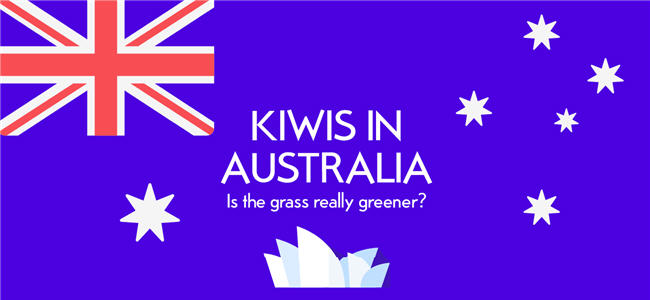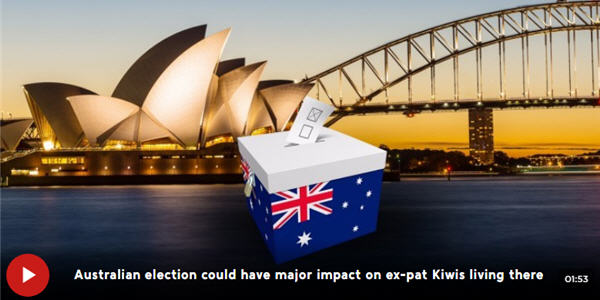Australian election could have major impact on ex-pat Kiwis

13 May 2019
Ryan Boswell - TVNZ 1 News
Ahead of the Australian federal election, 1 News Australia Correspondent Ryan Boswell looks at the reality for New Zealanders of living on the other side of the Tasman.

Reg's story
Six years ago, Reg Miller put his four-year-old daughter into care after losing the house they were living in.
Reg is still without a home and without a job six years on, living in a silver Ford SUV in Melbourne. Because he's a New Zealander Reg is not entitled to any social security benefits, but instead relies on Christian charities.
With four children living in Australia, Reg has strong ties to his second home, keeping him sleeping in his car.
Comparison of rights
New Zealanders can apply for permanent residency after five years. In contrast, all Australians who go to New Zealand are automatically granted residence visas, and can apply for permanent residence after living there for two years.
Australians can vote in New Zealand's elections after living there for one year, whereas Kiwis are not afforded that same right across the Tasman.
Most New Zealanders in Australia are not able to access social housing and welfare benefits, and also don't meet the requirements to get student loans for tertiary education.
Basic healthcare is available for New Zealanders in Australia, but they miss out on the National Disabilities Insurance Scheme, even though they're required to pay levies.
Maria's story
Maria Kumar is a volunteer social worker in Melbourne she sees a lot of New Zealanders “doing it tough” in Australia.
One of the organisations she works with is Melbourne Tautoko Whānau, a volunteer support group which helps struggling families with anything from food to finding homes. Because New Zealanders aren't eligible for benefits in Australia most struggling to get by are left completely without help.
Melbourne Tautoko Whānau has no funding from the Australian government but instead relies on koha from others, mainly Kiwi businesses in Australia, to keep them going.
Maria says a few New Zealanders have returned home from Australia, but the cost of even buying a plane ticket is out of reach for a lot of them.
High Commissioner to Australia
“If a sovereign nation decides to make a decision then we have to put up with it, but we believe that the way to address this is a better pathway to citizenships,” Dame Annette says.
She's focused on convincing whoever forms the next Australian government after the 18 May election to shorten the timeframe for New Zealanders wanting to become Australian citizens.
She says “something like 12,000 New Zealanders have applied and got citizenships” after having to jump through some “pretty high hurdles”.
“There is a threshold of income they have to earn, in the high $50,000, which can be quite hard for a lot of New Zealanders. It's very expensive to apply for citizenship, it can cost thousands of dollars,” Dame Annette says.
James' story
Working night shifts at McDonald's and during his summer break was how James Hall managed to reach the deadline of April 1 every year to pay his university fees during his undergraduate degree.
Despite living in Australia since the age of 11, James wasn't eligible for student loans, known as HECS-HELP loan in Australia, but managed to pay roughly $30,000 in university fees.
As a New Zealander who isn't on a “protected” pre-2001 Special Category Visa, James couldn't access any form or financial help or scholarships while studying at the University of Adelaide. The one privilege he was entitled to was paying domestic not international fees.
Until 2016 New Zealanders weren't able to access HECS loans. This changed in January 2016 with New Zealanders becoming eligible for the loan if they hold a Special Category Visa, first entered Australia as a dependent aged under 18 years, and meet residence requirements.
The option of coming home to study was always there for James, but the cost of moving and living in New Zealand stopped him.
With the lack of jobs in her specialist area in New Zealand, staying in Australia with its booming mining markets was a better option, despite the road to citizenship being easier for James' partner in New Zealand than his in Australia.
Getting James Australian citizenship has again been put on hold due to having to save to pay the fee.
Oz Kiwi
Advocacy groups, like Oz Kiwi, which is run by a group of volunteers, have been setup in Australia.
Spokeswoman Joanne Cox said over the last five years they've “worked extremely hard to educate politicians across the political spectrum on the issues negatively impacting New Zealanders living in Australia”.
Oz Kiwi recommends that eligible Kiwis take out Australian citizenship, saying this is “especially important as the Australian government is constantly reducing the rights of non-citizens”.
First individuals have to be granted a permanent visa, such as a Resident Return Visa or NZ 189 Visa, or be a Protected Special Category Visa-holder.
Residing in Australia for four continuous years immediately prior to applying is also a requirement, with at least the last 12 months as a permanent resident.
Joanne Cox believes that only one side of Australian politics is willing to provide a fair pathway to citizenship.
“The Australian Labor Party and Australian Greens are working with us, while the Liberal-National government has not engaged.
“Oz Kiwi are working with Labor because nothing will change under the current government. Former Prime Minister John Howard is a Liberal Party hero, and architect of the 2001 policy changes that saw Kiwis stripped of their rights,” Ms Cox said.
Prime Minister Scott Morrision's office did not respond to requests for comment, but the Liberal and National parties do not have policies to make it easier for New Zealanders to become Australian citizens.
Labor leader Bill Shorten's office told 1 NEWS that the Liberals have left New Zealand citizens living in Australia in a state of permanent migration limbo.
“Labor believes that there is an inequity for New Zealand citizens living in Australia under the terms of the Trans-Tasman Travel Arrangements,” a Labor campaign spokesperson says.
It said it would “consider the permanent residency status and potential citizenship arrangements” for Kiwis.
New Zealanders living in Australia will therefore be watching the outcome of the federal election on Saturday very carefully indeed. And they'll be wondering if anything will change, whoever forms the next government in Canberra.